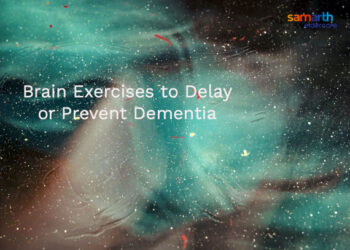Dementia is not uncommon any more. There is much more awareness about it as a disease, and the need to understand and manage it. Despite a lot of research going on about the various aspects of the topic, very little is known about the disease yet. There is still no clarity about why it happens or what steps can be taken to counter it, as a firm conclusion. Many theories abound, as some studies point to certain factors, and a few others to certain other factors. The only thing we know for sure is that we are yet to understand this disease fully.
It is essential to understand it, since it is a grave issue that is affecting more than 50 million people worldwide, and currently around 5.3 million people in India. This roughly translates to one in 27 people above the age of 60 in India. Consider another social aspect – 71% of the people above 60 years in India are rural. This disease is debilitating, and the affected people may lose their memory, and their independence, and more. They need constant 24*7 care, and India does not yet have the kind of care support seen in the developed countries, even in urban areas.
So, with the chance of the affected people in rural areas being more, the caregivers to these people mostly would be their family members. Their finances, societal influence, and many other factors put together can make this a very challenging situation. It is, therefore, imperative to create awareness about the disease, any possible prevention and treatment aspects. Only this mode of operation can ensure a dignified life for the seniors, especially those affected by the disease.

Join Now >
Understanding risk factors
The chances of getting dementia increase as you age, but it isn’t a normal thing to expect that all those who age will get it at some point. Family history is a good thing to keep track of, as again, the risk factors of it running in the family are high. Some other risk factors that have attributed to it are:
- Low early education
- Diabetes
- Obesity
- Alcoholism
- High blood pressure/cholesterol
- Depression
- Smoking
- Environmental factors like air quality, exposure to certain metals, etc.
The good news about this is the fact while there may not be much we can do about age, and genetic factors, most others are modifiable risk factors. We can control these to ensure that we are at a lesser risk of developing dementia. A recent study published a result, about how modifying a few risk factors can bring about a delay or prevention in 40% of dementia cases. Here is a look at some of the factors that people can work on, to bring about that change.
Delay or prevention factors
If you look at the list mentioned above, there are a few factors that can be easily tackled, and these are also mentioned in this latest study.
1. Stop smoking (Even passive smoking, which would mean encouraging others also to give up smoking or at least not in your presence).
2. Give up on alcohol, or at least limit the intake to less than 21 units per week.
3. Blood pressure to be continuously monitored and should be maintained 130 mm Hg or less. A healthy and balanced diet can help a lot in this.
4. Avoid air pollution; you may shift to cleaner environments, or ensure that you use masks when you step outside and use indoor air purifiers.
5. Ensure that kids, grandkids in the family and known circle are educated. This is to counter the bullet No.1 in the list above. Education helps not just in countering dementia, but for a better life overall. So, that is a must, anyway.
6. Reduce or prevent obesity; after the age of 40, when we lose track of what we are eating, we slowly accumulate weight, and then the lifestyle diseases also follow. Hence, it is essential to watch what we eat. Avoiding diabetes is also useful for preventing dementia.
7. Exercise regularly; exercise helps prevent obesity and also keeps many diseases at bay. A point to note here is, to also exercise the mind, and not just the body. Simple things like doing Crosswords, Puzzles, Sudoku, or even engaging in some hobbies and participating in social activities can help keep the mind active. Social participation can help in avoiding social isolation and related depression as well. These are also factors that can lead to dementia.
8. Prevent head injuries, as these can later cause dementia to set in. One way would be to ensure that you do not take up any adventurous activities without necessary safety precautions—simple safety measures like wearing a helmet while riding two-wheeler also helps.
9. Maintain the health of your ears by preventing hearing loss, through avoiding loud sounds, etc. If there is an issue, early intervention by wearing hearing aids can help lead a better and healthier life, and perhaps, also delay dementia.










